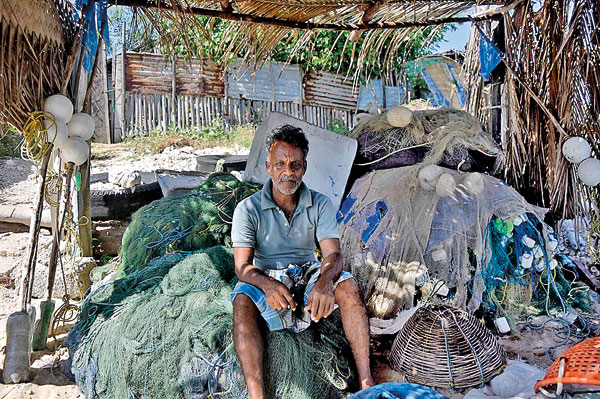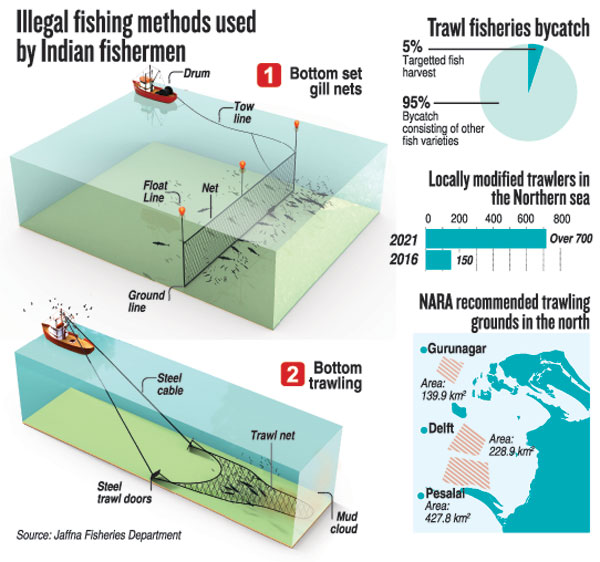News
Indian trawlers vacuum up Sri Lankan fish stocks after wrecking their own

Bleak future: Kathiramalai Kamalanathan
Valvettithurai, Jaffna: Ever since he was a teenager, Kathiramalai Kamalanathan, 56, has been fishing to support his family of five.
Even after his children were married off and settled down in nearby villages, he prefers not to depend on anyone and still goes out to sea.
The only difference is that, now, he needs to go beyond at least six nautical miles from the coast to get a decent catch. The reason: there is no fish in coastal shallow waters.
“During this season [July-August], we used to catch small fish varieties of neththali (anchovy), kooral, lobster, sardine, milk shark (paal sura), pomfret (Vaaval) nearer the coast and those days are gone now,” Kamalanthan told the Sunday Times, casting an empty look at the sea from his fishing hut.
For Kamalanathan, who had been displaced multiple times during the war and had only returned to build a home from scratch after the war’s end in 2009, a long passage to mid-sea at this age is a difficult task.
“Just imagine, I used to get around 30-35 kilograms of fish in one trip, whereas a local trawler brings at least 2,000 kilos. The worst offenders are Indian bottom trawlers because they wipe out everything on the seabed. What can we do?”
Following a protest last week in front of the Consulate General of India in Jaffna, northern fishermen handed over a petition demanding Rs 300 million as compensation for the damage caused by Indian fishermen to the fish catch and fishing equipment in recent years.
Like Kamalanathan, over two-thirds of the total 50,310 fishing households in the northern province who practice traditional fishing methods are facing a bleak future as fish stocks are depleted due to bottom trawling by Indian vessels, illegal fishing, and an increasing number of local fishermen engaging in trawling.
Over 700 locally modified trawlers are engaged in trawling in the northern sea, according to the Jaffna Fisheries Department. The number has increased from 150 trawlers reported in 2016.
In recent months, groups of north-based fishermen staged many protests across the province with a sole demand: implement the amended the law passed in 2017 that declared any type of trawling as ‘illegal fishing’ and introduced hefty fines. Yet, there had been no arrests made under this law.
The amendment to the Fisheries and Aquatic Resources Act banned bottom trawling, a harmful fishing practice. It also introduced hefty fines for violators. The law makes it illegal to either fish from, operate, or own a boat engaged in bottom trawling. The offence carries a fine of Rs 50,000 and up to two years of imprisonment.
Instead of implementing the law, the Fisheries Ministry commissioned the National Aquatic Resources Research and Development Agency (NARA), to identify potential trawling grounds around the island to issue licences for shrimp and prawn harvesting. Delft, Gurunagar in Jaffna and Pesalai, Mannar are the three trawling grounds recommended by NARA in the North.
Dr A. S. Soosai, a retired professor from the University of Jaffna and a Mannar-based fisheries researcher, said there are many factors contributing to the depletion of fish stocks, but over exploitation in the post-war period was a big reason.
“There has been no proper fisheries resources management or monitoring mechanism in place. The politicization and apparent corruption in the industry went to another level in recent years along with the number of individuals engaged in fishing,” Prof Soosai said, insisting that the Fisheries Department should stop issuing fresh permits for trawling. 
In trawling, for every kilo of targeted fish harvest, another 18 kilos of bycatch consisting of other fish varieties are caught in nets unintentionally, Prof. Soosai pointed out.
To avoid potential legal action, northern fishermen dump the bycatch in mid-sea, or transfer it to other fishing vessels to be claimed as their own catch. They would later sell it at much lower prices to wholesalers.
While there is a mandatory annual 61-day ban in India to protect marine resources, Prof Soosai said there were no steps taken in Sri Lanka to protect the seasonal fish banks and ensure the sustainability of fish stocks. “If overfishing and exploitation of fish resources continue at this scale, the consequences would be felt within the next decade,” he said.
Dr Rekha Maldeniya, former principal scientist of the Marine Research Division of NARA, told the Sunday Times, that since the sea bottom in the northern sea is unique due to massive historical coral reef patches, unregulated local trawling and Indian bottom trawling will cause immense damage at the expense of disrupting marine biodiversity in the region.
“Unlike Indian bottom trawlers who use steel/ iron bars, local fishermen use wooden slabs to reduce the damage,” Dr Maldeniya said stressing that some coral patches weigh 10-15 tons.
Nishan Perera, marine biologist and co-founder of Blue Resources Trust, a nonprofit marine research and conservation group, also expressed serious concerns over the entire marine eco-system being disrupted in the northern sea if trawling continues.
“These resources are already under stress due to other illegal fishing activities like dynamite fishing, which forced traditional fishermen to look for new fishing grounds as some endangered species in marine habitats are destroyed, accidentally get caught, or tangled in trawling and die,” Mr Perera said.
The two-month ban generally starts from April 14 and was introduced in 2014 based on recommendations by an expert committee set up by the Tamil Nadu State Fisheries Department. However, this ban is not applicable to traditional Indian fishermen who operate ‘vallams’ or catamarans.
At least 12,000 mechanised trawlers from 13 coastal districts of Tamil Nadu complied with a directive issued by the Fisheries Department of Tamil Nadu. However, Indian traditional fishermen are allowed to go fishing during this period.
“During my field research, I noticed that there has been a subtle decrease of some of the specific fish varieties, particularly sharks, promfret (Vaakal) in the northern sea due to extensive trawling and the increasing use of illegal fishing methods,” said Ramajeyam Gobiraj, a marine biologist of the Blue Resources Trust.
Mr Gobiraj said catches of these species have become rare, while the export demand skyrocketed in recent years.
For example, Kooral ((black-spotted croaker), is now rare in the northern sea and difficult to track despite a huge export demand. A kilo sell for more than Rs 10,000.
Northern fishermen say that use of monofilament nets by the Indians in Sri Lankan waters threaten the livelihood of some 50,000 fishing families in the province. They fear the country’s fisheries resources could be exploited further by overfishing and mismanagement of fisheries.
Compared with boats operated by small-scale Sri Lankan fishermen, the country boats, or vallams, operated by Indian fishermen are relatively large and high-powered enough to cross the International Maritime Border Line (IMBL).
Their monofilament nets known as ‘Thangus’ locally, were spread within the Sri Lankan maritime border as navy vessels intercept them. Though the use of monofilament nets is legal in India, the practice is banned in Sri Lanka.
After nearly a year of no arrests made due to COVID-19 concerns, in October the navy started arresting Indian fishermen who venture into Sri Lankan waters. So far, over 70 Indian fishermen have been detained and then released after being brought before courts. Their fishing vessels and equipment are seized.
The northern fishermen also stressed that Indian fishermen — trawler operators and traditional fishermen — trespass into Sri Lankan waters because the fish stocks in their waters have been cleaned up.
The president of the Mannar Fisheries Federation, Justin Zoysa, said that in a vaththai boat, Indian fishermen would bring bottom set gill nets that weigh 200-300 kilos to block at least 10 nautical miles.
“It looked like a fence beneath the sea. Our fishermen cannot go fishing when these nets are laid. Given this irresponsible behaviour of these Indian fishermen, how can we issue fishing permits to Indian fishermen at the expense of our livelihood?” Zoysa asked.
Meanwhile, fisheries experts fear the complete depletion of fish stocks like in Tamil Nadu.
“Tamil Nadu trawlers fish in Sri Lankan waters because their own resources are badly managed and overfished. Sri Lanka’s small-scale fishing communities will be impacted from licences given to Tamil Nadu country boat owners to fish in Sri Lankan waters. The consequences would be loss of livelihood, income for fishing communities and the slow, steady destruction of marine resources on the Sri Lankan side of the Palk Bay, as has happened on the Tamil Nadu side of the Palk Bay, by Tamil Nadu boat owners,” Steve Creech, a fisheries consultant based in Sri Lanka, said.
For Kamalanathan, his fishing needs are minimal enough to support his family and live in peace considering his age. “But it is increasingly difficult to do that, let alone make any decent money.”
India holds on to ‘humanitarian’ issue line
Amid protests by northern fishermen demanding action against Indian fishermen in northern waters, a three-member delegation led by Indian High Commissioner in Sri Lanka, Gopal Baglay visited Tamil Nadu fishing villages in Rameswaram from November 21-24 to study alternatives taken by New Delhi.
It was also agreed to facilitate an early meeting of the India-Sri Lanka Joint Working Group on Fisheries as well as interactions between fishermen’s associations of both countries. The High Commission said that a team from Tamil Nadu would visit Sri Lanka to finalise modalities of the auction of the unsalvageable Indian fishing boats in various Sri Lankan harbours.
In a written response to questions by the Sunday Times, the Indian High Commission in Colombo said that the Indian central government had undertaken many steps such as diversification into deep-sea fishing, infrastructure created to facilitate deep-sea fishing, promotion of alternative livelihood through mariculture and aquaculture activities in the coastal areas as an alternative method for Tamil Nadu fishermen.
Indicating that all fisheries issues arising during the implementation of such bilateral understandings are being taken up at the higher level of the government, the High Commission said, “it has been stressed that the fishermen issue is a humanitarian and livelihood concern and that use of force or violence in any manner should be avoided, in line with the agreement between the two governments’’.
The Indian side also reiterated the need for releasing all fishing boats in Sri Lankan custody in line with the commitment given by President Gotabaya Rajapaksa during his state visit to India in November 2019. Accordingly, 130 boats are to be released, while 63 boats are under trial custody in Sri Lanka, according to the High Commission.
The best way to say that you found the home of your dreams is by finding it on Hitad.lk. We have listings for apartments for sale or rent in Sri Lanka, no matter what locale you're looking for! Whether you live in Colombo, Galle, Kandy, Matara, Jaffna and more - we've got them all!

